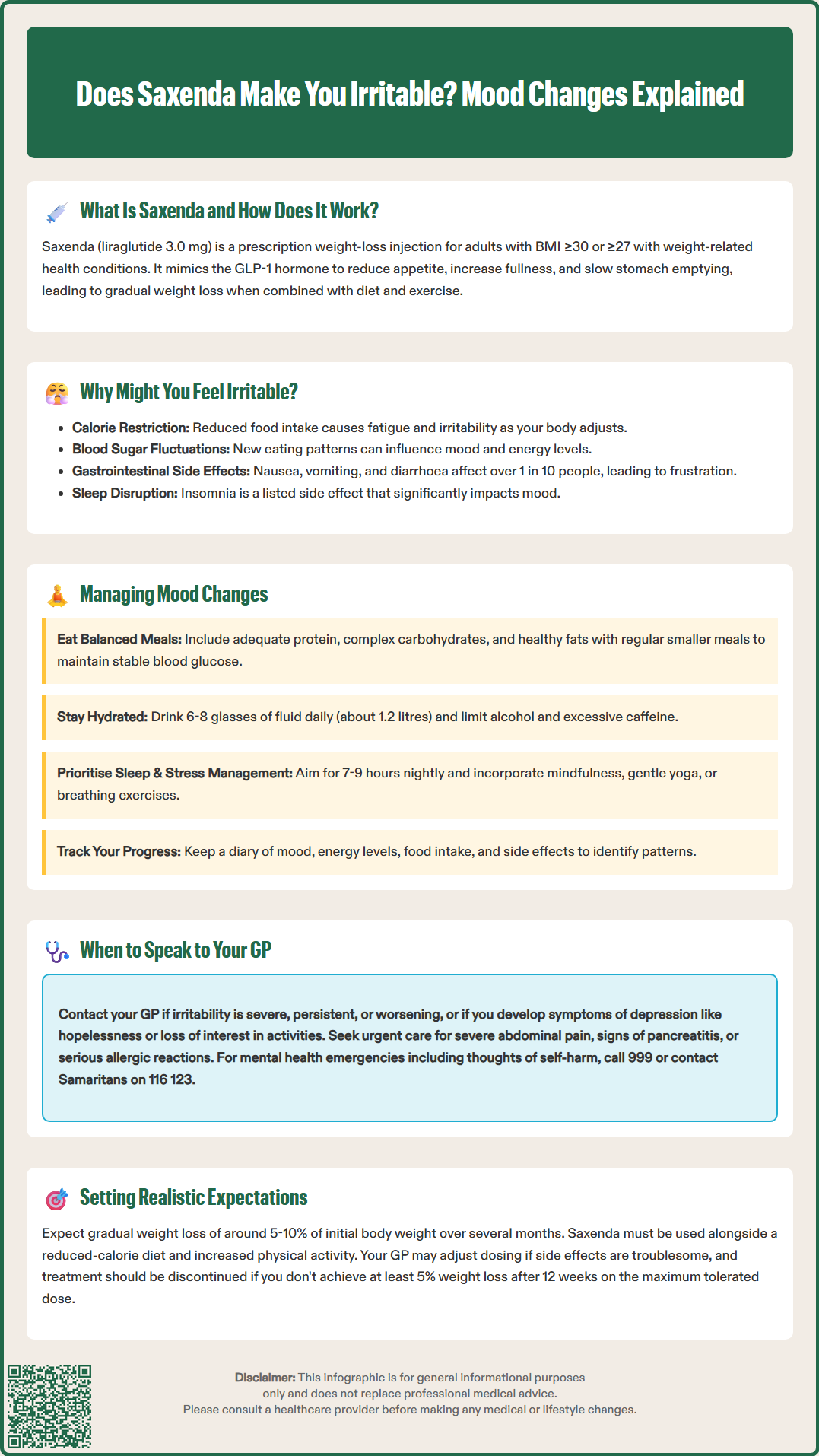
Does Saxenda make you irritable? Whilst irritability is not amongst the most commonly reported side effects of Saxenda (liraglutide), some patients do experience mood changes during treatment. These feelings may stem from several factors, including the calorie restriction required alongside the medication, gastrointestinal side effects such as nausea, blood glucose fluctuations, or sleep disturbances. Understanding the potential causes of irritability and knowing when to seek medical advice can help you manage your weight loss journey more comfortably and safely whilst using this GLP-1 receptor agonist.
Quick Answer: Irritability is not a commonly listed side effect of Saxenda, but mood changes may occur due to calorie restriction, gastrointestinal symptoms, blood glucose fluctuations, or sleep disturbances associated with treatment.
Saxenda (liraglutide 3.0 mg) is a prescription medicine licensed in the UK for weight management in adults with a BMI ≥30 kg/m² (obesity) or ≥27 kg/m² with at least one weight-related health condition. It is also indicated for adolescents aged 12-17 years with obesity and body weight above 60 kg, when initiated by specialists. Saxenda belongs to a class of medications called glucagon-like peptide-1 (GLP-1) receptor agonists, which were originally developed for type 2 diabetes management.
The active ingredient, liraglutide, works by mimicking a naturally occurring hormone called GLP-1 that your body produces after eating. This hormone acts on several areas of the brain involved in appetite regulation, particularly the hypothalamus. By activating GLP-1 receptors, Saxenda helps you feel fuller for longer periods, reduces hunger signals, and may slow gastric emptying—the rate at which food leaves your stomach. These combined effects typically lead to reduced calorie intake and gradual weight loss when used alongside a reduced-calorie diet and increased physical activity.
Saxenda is administered as a once-daily subcutaneous injection, usually in the abdomen, thigh, or upper arm. The dose is gradually increased over five weeks, starting at 0.6 mg daily and building up to the maintenance dose of 3.0 mg daily. This titration schedule helps minimise gastrointestinal side effects, which are the most commonly reported adverse reactions. The titration may be slowed if side effects are not tolerated.
According to the MHRA-approved product information, Saxenda should only be prescribed as part of a comprehensive weight management programme that includes dietary modification and increased physical activity. It should not be used during pregnancy or breastfeeding, and caution is needed in people with a history of pancreatitis or gallbladder disease. Saxenda should not be used in combination with other GLP-1 receptor agonists.

Irritability is not listed among the most common side effects in the official Saxenda Summary of Product Characteristics (SmPC). However, some patients do report mood changes during treatment. While evidence for a direct causal link is limited, it's important to note that GLP-1 receptor agonists act on the central nervous system, and mood-related events have been reported with this class of medicines.
Calorie restriction and dietary changes are perhaps the most significant contributors. Saxenda is prescribed alongside a reduced-calorie diet, and substantial calorie reduction can affect mood, energy levels, and emotional wellbeing. When your body adjusts to consuming fewer calories, particularly in the initial weeks of treatment, you may experience fatigue, difficulty concentrating, or increased irritability. These symptoms are often related to the dietary changes rather than the medication itself.
Blood glucose fluctuations may also play a role, especially if you have prediabetes or are adjusting to new eating patterns. Although hypoglycaemia (low blood sugar) is uncommon with Saxenda alone, it can occur, particularly in patients also taking insulin or sulfonylureas for diabetes. Changes in meal timing and composition can affect blood sugar stability, which in turn influences mood and energy.
Gastrointestinal side effects such as nausea, vomiting, diarrhoea, and constipation are very common with Saxenda, affecting more than 1 in 10 people. Persistent nausea or digestive discomfort can understandably affect your mood and quality of life, leading to feelings of frustration or irritability. Additionally, if these symptoms interfere with sleep or daily activities, the resulting fatigue may further impact emotional wellbeing.
Insomnia, which is a listed adverse reaction to Saxenda, can also contribute significantly to irritability and mood changes. It is worth noting that gastrointestinal symptoms typically improve as your body adjusts to the medication, usually within the first few weeks of reaching each new dose level.

Mounjaro® is the most innovative GLP-1 medication proven to dramatically curb appetite, hunger, and cravings to help professional men achieve substantial weight loss.
Start Here
Wegovy® is a weekly injectable GLP-1 medication with proven effectiveness in reducing appetite, hunger, and cravings to help busy professionals lose significant weight.
Start HereIf you experience irritability whilst taking Saxenda, several practical strategies may help you manage these feelings whilst continuing your weight management programme.
Optimise your nutrition by ensuring your reduced-calorie diet is well-balanced and includes adequate protein, complex carbohydrates, and healthy fats. Rather than drastically cutting calories, work with your GP, practice nurse, or a registered dietitian to develop a sustainable eating plan that provides sufficient nutrients and energy. Eating regular, smaller meals throughout the day—rather than skipping meals—can help maintain stable blood glucose levels and prevent hunger-related irritability. Following the NHS Eatwell Guide can help ensure a balanced, nutritious diet.
Stay well hydrated, as dehydration can worsen fatigue and mood changes. The NHS recommends drinking 6-8 glasses of fluid daily (about 1.2 litres), and more if you are experiencing vomiting or diarrhoea, exercising, or in hot weather. If nausea is problematic, try sipping water slowly throughout the day rather than drinking large amounts at once. Limiting alcohol and excessive caffeine may also help, as these can affect mood and sleep quality.
Prioritise sleep and stress management. Weight loss programmes can be physically and emotionally demanding, and adequate rest is essential for mood stability. Aim for 7–9 hours of quality sleep per night, and consider incorporating stress-reduction techniques such as mindfulness, gentle yoga, or breathing exercises into your daily routine.
Monitor your symptoms by keeping a simple diary noting your mood, energy levels, food intake, and any side effects. This can help you identify patterns—for example, whether irritability occurs at particular times of day or in relation to specific foods or activities. Share this information with your healthcare provider, as it can guide adjustments to your treatment plan.
Maintain realistic expectations about the pace of weight loss. Saxenda typically produces gradual weight reduction of around 5–10% of initial body weight over several months. Unrealistic expectations or comparing your progress to others can create frustration and affect your emotional wellbeing.
Whilst mild, temporary mood changes may be manageable with lifestyle adjustments, certain situations warrant prompt medical review. Contact your GP or healthcare provider if:
Irritability is severe, persistent, or worsening despite dietary and lifestyle modifications
You experience significant mood changes including persistent low mood, anxiety, or thoughts of self-harm
You develop symptoms of depression such as loss of interest in activities, feelings of hopelessness, or changes in sleep patterns beyond initial adjustment
Gastrointestinal side effects are severe or do not improve after several weeks, as these may be contributing to mood changes
You experience signs of dehydration including dizziness, dark urine, or reduced urination
You have symptoms of low blood sugar (hypoglycaemia) such as trembling, sweating, confusion, or rapid heartbeat—particularly if you are taking other diabetes medications
Stop taking Saxenda and seek urgent medical attention if you experience:
Severe, persistent abdominal pain which may radiate to your back, possibly with vomiting (signs of acute pancreatitis)
Pain in the right upper abdomen, fever, or yellowing of the skin or eyes (possible gallbladder problems)
Signs of a serious allergic reaction such as swelling of the face, lips, tongue or throat, breathing difficulties, or severe rash
For mental health emergencies, including thoughts of harming yourself, call 999 or go to A&E immediately. Alternatively, contact NHS 111 or the Samaritans on 116 123 for urgent support.
Your GP may recommend adjusting the dose escalation schedule, slowing the rate of increase to allow your body more time to adapt. In some cases, temporarily reducing the dose or pausing treatment may be appropriate whilst addressing contributing factors.
It is important to remember that Saxenda is not suitable for everyone. According to NICE guidance and the product licence, treatment should be discontinued if you do not achieve at least 5% weight loss after 12 weeks on the 3.0 mg dose (or maximum tolerated dose). Regular review of treatment effectiveness and tolerability is essential.
If you experience any side effects, talk to your doctor, pharmacist or nurse. This includes any possible side effects not listed in the package leaflet. You can also report side effects directly via the MHRA Yellow Card Scheme at yellowcard.mhra.gov.uk or search for 'MHRA Yellow Card' in the Google Play or Apple App Store.
Whilst irritability is not listed amongst the most common side effects, some patients report mood changes during Saxenda treatment. These may be related to calorie restriction, gastrointestinal side effects, blood glucose fluctuations, or sleep disturbances rather than a direct effect of the medication itself.
Ensure your reduced-calorie diet is well-balanced with adequate protein and nutrients, eat regular smaller meals to maintain stable blood glucose, stay well hydrated, prioritise 7–9 hours of sleep nightly, and consider stress-reduction techniques such as mindfulness or gentle exercise.
Contact your GP if irritability is severe, persistent, or worsening, if you develop symptoms of depression or anxiety, if gastrointestinal side effects do not improve after several weeks, or if you experience signs of hypoglycaemia or dehydration. Seek urgent help for thoughts of self-harm or severe abdominal pain.
All medical content on this blog is created based on reputable, evidence-based sources and reviewed regularly for accuracy and relevance. While we strive to keep content up to date with the latest research and clinical guidelines, it is intended for general informational purposes only.
DisclaimerThis content is not a substitute for professional medical advice, diagnosis, or treatment. Always consult a qualified healthcare professional with any medical questions or concerns. Use of the information is at your own risk, and we are not responsible for any consequences resulting from its use.